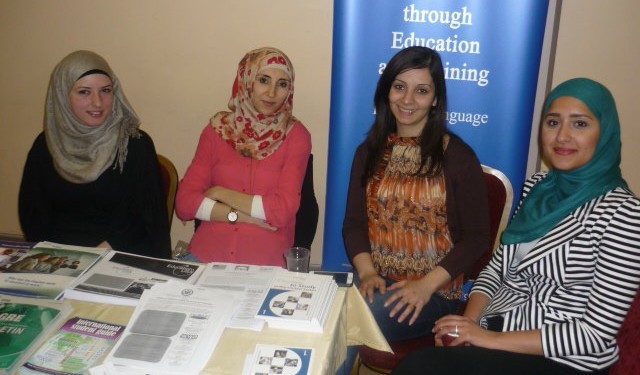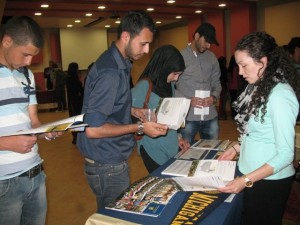The occupied territories of the West Bank and Gaza have seen economic growth rates of up to 8% per annum in recent years, but prosperity still eludes the majority. Unemployment stands at around 22% and Palestine’s fractious relationship with Israel restricts movement and economic growth, with the territories heavily dependent on aid. Not surprisingly overseas study remains a luxury available to the few – a shame given the transformative effects it can have.
News and business analysis for Professionals in International Education
Have some pie!
Palestine: breaking down barriers to study abroad
 Palestinian students at the student fair organised by AMIDEAST and the US Consulate; 15 US schools attended.
Palestinian students at the student fair organised by AMIDEAST and the US Consulate; 15 US schools attended. Adding to the problem, foreign schools have spent little time or money on marketing in Palestine and rarely visit due to security concerns. The numbers reflect this: out of a population of four million only 502 Palestinians studied in Germany in 2012, 331 in the USA, 190 in the UK, 52 in Australia and 43 in Canada.
Could this now be changing? The American Consulate General in Jerusalem and AMIDEAST, an American nonprofit organisation with offices across the MENA region, organised what they believe is the largest ever US education fair in Palestine this April, attended by around 15 US universities, community colleges and private schools. Institutions from the State University of New York to the New York Film Academy came to Ramallah in the West Bank, curious about a market that could one day blossom. Hundreds of students attended.
“I think that people are talking to each other and learning the West Bank is usually pretty safe”
“What I’ve noticed is that over the years, the participation in these US study fairs has grown, with the size of each new American delegation larger than the previous one,” says Steven Keller, country director of AMIDEAST, which facilitates study abroad opportunities for Palestinians through the Fulbright Foreign Student Program and other programmes at the high school, undergraduate and graduate levels.
“I think that people are talking to each other and learning the West Bank is usually pretty safe. And more importantly, that there are some very smart, articulate, driven and interested students who would be great to have on their campuses.”
 Schools also find the US government happy to help them. The US Commercial Service also attended the fair, keen to promote US education exports as a form of diplomacy. (The US government committed $495.7 million in aid to the Palestinian territories in FY 2012 in what it calls “an essential part of negotiated two-state solution for Palestinians and Israelis, promoting a comprehensive peace in the Middle East”).
Schools also find the US government happy to help them. The US Commercial Service also attended the fair, keen to promote US education exports as a form of diplomacy. (The US government committed $495.7 million in aid to the Palestinian territories in FY 2012 in what it calls “an essential part of negotiated two-state solution for Palestinians and Israelis, promoting a comprehensive peace in the Middle East”).
Maria Andrews, commercial counsellor at the American Embassy in Tel Aviv, told The PIE News that more Palestinians at US schools meant more exposure to US education and culture. Palestinians of course reap significant benefits. These are partly academic: despite a 30% participation rate in higher education across the occupied territories, Palestinian universities are seriously under resourced. Keller says that students who study abroad enjoy a “transformative personal experience” too – particularly if they have never been outside Palestine.
“People come back as change agents, and make changes in the education system here”
“It exposes them to diversity and more of an opportunity to develop critical thinking skills, which the education system lacks here,” he says. “People come back as change agents, and make changes in the education system here or the field that they’re working in.”
He hopes the fair is a sign of things to come but concedes there are major hurdles. English proficiency is one, given most students cannot get into quality US schools without a good grasp of the language. The quality of tuition in Palestine is low, foreign teachers are in short supply and lessons and testing can be costly.
“Palestinians also struggle with taking standardised tests such as SATs and TOEFL which are important to US schools,” Keller says. “Even top students may need to take them again and again. This can be a barrier not just to getting in, but also to accessing scholarships.”[More>>]
Still looking? Find by category:



Some of you might have heard about Dr Izzeldin Abuelaish story, known now as “the Gaza doctor”. Following the tragic death of 3 of his daugthers and one niece in a bombardment back in 2009, Dr Abuelaish never sank into hatred, on the contrary he relentlessly calls for a dialogue between Palestinians and Israelis. His book “I shall not hate” is a fantastic lesson against hatred and revenge. He set up a fund called “Daughters for Life” to help sponsoring Palestinian girls and women for their studies abroad in order as a way forward in the Middle East. One can donate. Read more on http://daughtersforlife.com. (Credit to ILAC who had invited Dr Abuelaish during a pre ICEF fam trip in Toronto at which I participated).
I am thrilled about the efforts being made to recruit more international students to learn and collaborate with students in the US. Diversity in thought and perspective comes when there are real efforts made at understanding and appreciating those from backgrounds different than our own. The unfortunate part is there are many obstacles which discourage students of Palestinian descent from pursuing education in the US, mainly financial challenges and education about opportunities in the US. In addition prejudices about race and culture may discourage the effort to bring more Palestinians to the US to study. However, this article inspires hope as efforts are being made. The wheels may turn slowly, but at least they are turning.